 |
The White Earth Andrew McGahan |
[This novel has been shortlisted for the 2005 Miles Franklin Award.]
The relationship between the peoples of Australia and the Australian landscape has been undergoing some profound changes over the past twenty years. Some of that has been environmental and a lot has been political.
The political side of the change came to a head back in the early 1990s when the Supreme Court handed down its Mabo decision: basically dispensing with the concept of terra nullius, the concept that Australia was unoccupied or untended when Europeans arrived in the late 1700s. It also had the effect of allowing Native Title claims on Crown Land where local indigenous people could show a continuing relationship and contact with the land prior to European colonisation. As I recall, the more sane of the Mabo opponents claimed this would result in Native Title claims on suburban backyards, which was, of course, blatantly ridiculous. I won't go into what the others had to say.
It is into this political storm that Andrew McGahan has pitched his fourth novel, The White Earth. The title itself gives a hint of what is in the book but it has deeper meanings. McGahan introduces us to William on the day his father is killed in a farming accident. The mysterious figure of an "uncle", John McIvor, appears and whisks William and his mother off to Kuran Station to live. It is through William's eyes that we are introducted to McIvor and to his long association with the land of the station. He loves the place, respects it and cares for it. And for all of the first third of this book you are led to believe that McIvor is an honourable man, doing the best he can in a harsh and unforgiving land. But he has a secret. His sense of ownership has warped him into being over-protective and into believing that he, and he alone, has the right of land ownership. This has led him into helping to run a secret army of followers who view the federal Native Title Act of 1993 as being deliberately targetted at them, and them alone.
McGahan handles all the conflicting land relationships with care, giving each an airing and not judging the characters or their views. Many times in the novel he could have stumbled badly but he negotiates the hazards with skill. There is a lot to like about this book and only one point at which I would have recommended a change, and then only a small one, to the manifesto of McIvor's followers. Invoking the name of a now-fading Queensland political group left a jarring sensation with this reader. It didn't detract from the overall effect of the work, it just seemed out of place.
This novel is a departure from McGahan's earlier works and moves him into a literary strata sparsely populated by Australian writers. It has been shortlisted for the 2005 Miles Frankin Award, and must at this time be considered one of the favourites.
